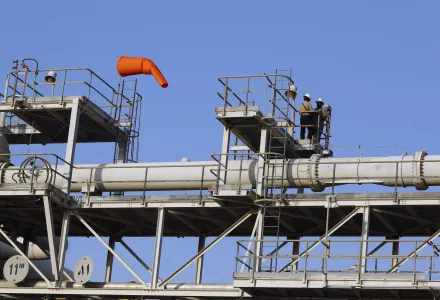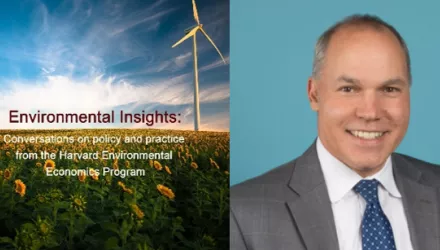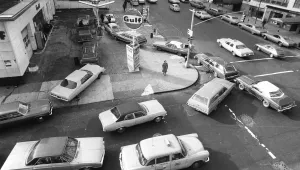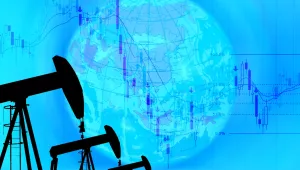
Introduction
The increase in gasoline prices stemming from the oil crisis overshadowed the United States presidential debate of October 1980. Ronald Reagan and then President Jimmy Carter were going head to head in the election. Carter’s, the incumbent’s, loss that year coincided with a peak in oil prices. Other modern US presidential incumbents—for example, Presidents Ford and Bush Sr - also lost their reelection bids following oil price spikes. This anecdotal evidence points to a broader question about the role of exogenous shocks in determining electoral outcomes.
This paper explores the effect of oil price shocks on the odds of reelection of political incumbents. We use a novel data set of 207 elections in 50 democracies. In addition to the 207 elections, our data set includes polling data in the run-up to elections. The polling data allow us to explore the effect of exogenous shocks prior to elections. Depending on the political system, the data set includes elections of the chief executive in parliamentary or presidential systems. As large oil imports leave a country vulnerable to changes in crude oil prices, we rely on these prices as an exogenous source of variation in terms of trade. The shock consists of two components, namely the change in international crude oil prices and the exposure of a country to crude oil imports.
The results show that an increase in oil prices one year prior to election significantly reduces the odds of reelection for the incumbent party. In our sample, the average crude oil price shock is respectively 0.25 percent for elections when the incumbent party loses, and -0.55 percent when the incumbent party wins. This pattern suggests that a negative terms of trade shock associated with rising oil prices could contribute to the change in political fortune for incumbents.
Since most countries in our sample are oil importers, an increase in crude oil prices would reduce the purchasing power of the population, consistent with Hamilton (2003) and Blanchard and Gali (2009). An increase in oil prices is found to reduce consumption growth and hurt the chances of incumbent reelection one year later. Both right-wing and left-wing incumbent parties are likely to lose elections following a crude oil price increase. We verify that the winning parties are more likely to belong to the opposite end of the political spectrum. In other words, following an oil price increase, a left-leaning incumbent party is more likely to be replaced by a right-leaning party and vice versa.
The results remain robust to a variety of checks and alternative specifications. Results from polling data also reinforce our main findings. We use data from multiple polls prior to a general election, which are aggregated to construct a monthly series. We find that for each election, fluctuations in oil prices 12 months before the polls shift the standing of the incumbent party. Our results survive when we control for voter turnout, pre-determined elections, other macro variables, and different lag structure for oil shocks.
This research is related to a large public choice literature suggesting that voters act rationally. Voters favor candidates who are expected to deliver the highest “monetary return” (Buchanan and Tullock 1962). Downs (1957) and Hinich and Munger (1994) argue that in addition to self-interest, ideology, culture, and moral codes also drive the behavior of voters. However, the empirical support for the role of ideology is mixed (see Degan and Merlo, 2009). Using US election data, Henry and Mourifie (2013) empirically reject that ideological bias. Our findings also suggest that citizens on average seem to vote without a clear ideological pattern in response to exogenous shocks.
Our findings are consistent with the literature investigating exogenous shocks on electoral outcomes. A number of papers examine the effects of natural disasters or other shocks originating outside the local economy on elections (see, for example, Abney and Hill (1966); Achen and Bartels (2004, 2017); Cole et al. (2012); Gasper and Reeves (2011); Healy and Malhotra (2010); Healy et al. (2010) and Wang and Berdiev (2015)). A consistent finding is that the incumbents’ electoral fortunes suffer following such shocks.
Finally, our paper is related to the political business cycle literature that examines how voters respond to economic conditions. This literature, dating back to Nordhaus (1975), conventionally assumes voters to be myopic (i.e. they focus only on economic outcomes in election years, as in Wlezien (2015)). The effect of growth on re-election prospects was found to be insignificant in most cross-section studies in developed countries, with the United States being an exception (see Brender and Drazen (2008) for a summary, and Alesina and Rosenthal (1995) for the United States). Alesina et al. (1997), however, provide evidence that other OECD countries behave similarly to the United States.
The remainder of the paper is as follows. Section 2 presents the data. Section 3 shows the main results. Section 4 presents several robustness checks. Section 5 concludes.
Arezki, Rabah, Simeon Djankov, Ha Nguyen and Ivan Yotzov. “Reversal of Fortune for Political Incumbents after Oil Shocks.” March 2021





